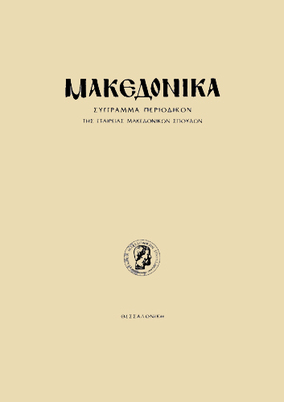Η σημερινή κατάσταση της κουτσοβλαχικής γλώσσας στον Ελλαδικό χώρο : (ιστορική, εθνολογική, κοινωνική και γλωσσολογική διάσταση)
Part of : Μακεδονικά ; Vol.31, 1998, pages 185-212
Issue:
Pages:
185-212
Parallel Title:
The Present State of the Koutsovlach Language in Greece : Historical, Ethnological, Social, and Linguistic Considerations.
Section Title:
Articles
Abstract:
Koutsovlach has survived as a second, acquired language only in the everyday oral communication of the Koutsovlachs. It has been in existence for more than two thousand years, ever since the Roman period. It is difficult to study because it lacks a written form and it was little mentioned until the end of the 18th century. The foreign literature on Koutsovlach, notably the Romanian literature of the late 19th and early 20th century, makes no objective contribution to its scientific investigation, being aligned with the general propaganda of the period. The Greek literature, which appeared early in the 20th century and particularly after 1970, presents quite a satisfactory study of the Koutsovlach language and culture. The specialised studies (post-1970) have been based on painstaking personal investigations and recordings by language scholars. Koutsovlach has been spoken continuously down the ages, but the Romanian propaganda placed it under severe strain. Following the economic and demographic upheavals of 1912, and particularly after WW II, the Kou tsovlachs abandoned their compact communities for the urban centres, leaving their language behind. It still survived to a satisfactory extent until the decade 1960-70. Thereafter, however, it began to diminish fast, now losing its local idioms too, owing to the departure of the Koutsovlachs. The result was the development of a more general form of the language, “Koutsovlach koine”. Nonetheless, two dialectal groups were still distinguishable, with certain differences, one representing the so-called northern idioms and the other the southern. Today (1996), Koutsovlach has all but ceased to be spoken and its extinction is inevitable. The end of this century will bring the life-cycle of the Koutsovlach language to a close and the historical role of the Koustovlach people will end with it.
Subject (LC):
Notes:
856:https://ejournals.epublishing.ekt.gr/index.php/makedonika/article/view/5681, DOI: https://doi.org/10.12681/makedonika.120
Electronic Resources:




